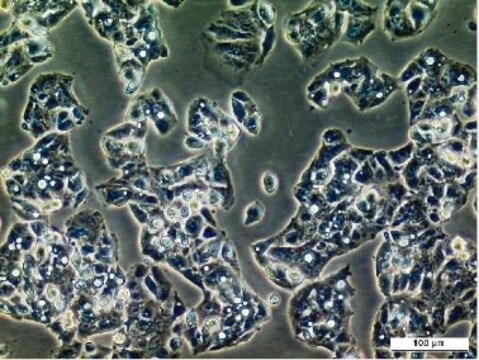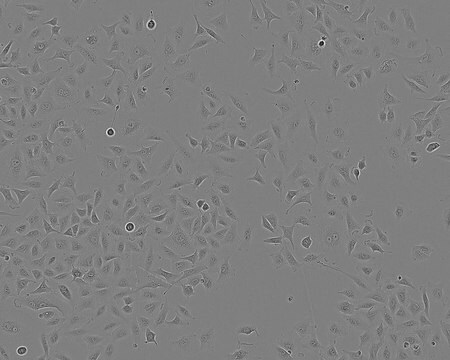About This Item
Kod UNSPSC:
41106514
Polecane produkty
product name
SW 626, 91091203
pochodzenie biologiczne
human colon
tryb wzrostu
Adherent
kariotyp
Hypertetraploid; modal no. 104
morfologia
Epithelial
produkty
Not specified
receptory
Not specified
metody
cell culture | mammalian: suitable
powiązane choroby
metastasis
Warunki transportu
dry ice
temp. przechowywania
−196°C
Pochodzenie linii komórkowej
Human Caucasian ovarian metastasis of a primary colon adenocarcinoma
Opis linii komórkowej
Although originally thought to be of ovarian origin, a recent report has suggested that the SW 686 cell line might have been derived from an ovarian metastasis of a primary adenocarcinoma of the colon Furlong, et al., 1999. The SW 626 cell line was initiated by A. Leibovitz in January 1974 at the Scott and White Clinic, Temple, Texas from a surgical specimen from a cystadenocarcinoma of the ovary in a 46 year old female Caucasian. The histopathology of the specimen was determined to be grade III adenocarcinoma.
pożywka hodowlana
L15 + 2mM Glutamine + 10% Foetal Bovine Serum (FBS).
Rutyna subkultury
Split sub-confluent cultures (70-80%) 1:3 to 1:6 i.e. seeding at 2-3x10,000 cells/cm2 using 0.25% trypsin/EDTA; CO2 is not needed. Medium change after 4-5 days. 37°C.
Inne uwagi
Additional freight & handling charges may be applicable for Asia-Pacific shipments. Please check with your local Customer Service representative for more information.
Ta strona może zawierać tekst przetłumaczony maszynowo.
Certyfikaty analizy (CoA)
Poszukaj Certyfikaty analizy (CoA), wpisując numer partii/serii produktów. Numery serii i partii można znaleźć na etykiecie produktu po słowach „seria” lub „partia”.
Masz już ten produkt?
Dokumenty związane z niedawno zakupionymi produktami zostały zamieszczone w Bibliotece dokumentów.
Nasz zespół naukowców ma doświadczenie we wszystkich obszarach badań, w tym w naukach przyrodniczych, materiałoznawstwie, syntezie chemicznej, chromatografii, analityce i wielu innych dziedzinach.
Skontaktuj się z zespołem ds. pomocy technicznej


